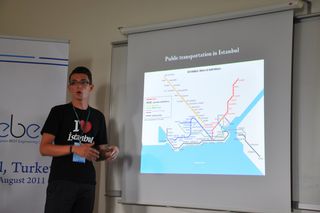Confidence
Safe Spaces Can Be Dangerous
Preventing students from growing as individuals is really quite scary.
Posted March 20, 2017 Reviewed by Davia Sills

During my recent teaching career, I was faced with the dilemma of either gently pushing a student to grow as a person or allowing her to remain stuck in her safe little cocoon. What made it a tricky dilemma was that my superior at the time fully supported the second option, that is, allowing this young woman to remain safely neurotic and developmentally stunted in her fear, which, in this case, was public speaking.
To be specific, I’d had an assignment on the syllabus from the start of the semester: an in-class debate in which each student would present an argument for his or her team’s position, and it would count as their midterm grade. In addition to the oral presentation piece, they would turn in a write-up of the position they defended. A pretty sweet deal for a midterm, I thought.
At any rate, a student emailed me two days before the debate, saying she had severe social anxiety and that the thought of presenting in class made her feel sick; indeed, she was worried she would throw up in class. This made me think of the time I presented at an international conference in England during my first year of graduate school. I was so nervous walking up to the stage where the podium awaited that I almost welcomed a heart attack. A heart attack at age 31 would have really sucked, but on the bright side, I would’ve been given a pass on the presentation.
My reaction to her email was ambivalent. On the one hand, I get it. I know all about presentation jitters. But on the other hand... This was an honors class, students had had six weeks’ notice, and it was a very small class where everyone knew each other, and we had a genuinely good time together most days.
What was the risk? One of her classmates would notice she was nervous? She’d rush through her presentation in 90 seconds instead of the required two minutes? Her classmates would discover she stinks at public speaking? Really, are any of these worries earth-shattering?
While my first instinct was to say, come on, suck it up, it’s good practice, and it’s for your grade, etc., something urged me to seek counsel from the administrator in charge, as it was my first time teaching in this unit. I explained my position: Encouraging this student to suffer her two minutes in front of her classmates would serve her well in the long run—she would realize that she didn’t die of a heart attack or throw up in the classroom out of nervousness, and then, just like magic, it would be easier the next time. She’d have grown as a person.
Unfortunately, the administrator didn’t see it that way. He worried that making her fulfill this assignment would cause her undue stress and hardship and make her want to drop the class, and even, he worried, drop out of college!
Wow.
I struck a compromise: I gave the student an "out," saying that if she absolutely could not bring herself to do it, she should just be “sick” that day, and her teammates could surmise about her absence whatever they wanted. But, I wrote, I strongly encourage you to do it. It’s awful the first time around, but it does get easier. Just let it be practice. Isn’t college all about practice and learning and challenging yourself? We’re a friendly group, and your teammates are counting on you, blah blah blah. Oh yeah, and it’s your midterm grade.
Much to my surprise, I showed up the day of the debate, early, with coffee in hand, and there she was, sitting at the table, ready to go. OK, I thought, this looks promising. The debate went well, with the star of the show giving her defense with confidence, poise, and a smile on her face. If she was freaking out inside, no one could tell, not even me. She got full credit for the assignment, and her classmates and teammates presumably never knew she’d been considering bailing on them at the last minute.
Curiously, after that class, she came out of her shell, volunteering to go up to the board when the class was brainstorming, telling jokes in class, and bursting with confidence. The transformation was amazing. It was the result I was hoping for.
Sometimes when you think you cannot do something, and someone tells you you can, that’s all it takes. The payoff is a boost in confidence, solid life experience, and just knowing that you’re more resilient than you thought. Some people fulfill this human drive by surviving a 12-mile hike at high elevation, others fulfill it by enduring childbirth without anesthesia, and some people need a little push to get up in front of their peers and talk for two minutes. They might feel, at a very visceral level, that these people support and believe in them.
It’s powerful. It’s an important part of human development. And college, I think, should be a place where we do things that are uncomfortable, new, and challenging, not just in academic ways, but in personal, human ways that make us vulnerable and scared so that if we come out on top, as more deeply experienced human beings, we are better for it.
“Safe” spaces let us hide in our comfortable, little existence, which is dangerous because they prevent us from growing and changing when faced with adversity—creating new neural networks and adapting. And the ability to do just those things is what’s kept us alive as a species. The fittest in the competition for survival are those that can adapt in order to face challenges and overcome them.
If students are given opportunities for success in college, their chances are stronger for thriving professionally and personally after college when they’re out on their own.




